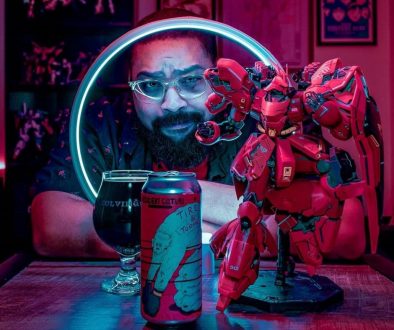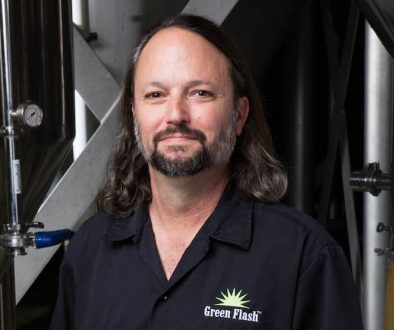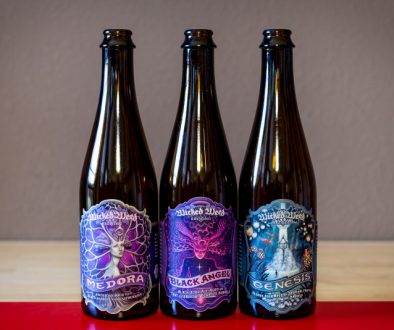Interview With Fullsteam Brewery’s Sean Lilly Wilson
 I sat down with Sean Lilly Wilson, the owner of and Chief Executive Optimist at Fullsteam Brewery here in Durham, North Carolina. We met up at the brewery’s tavern, and over a pint of Working Man’s Lunch (one of my favorite brown ales, the flavor brings to mind that of a Moon Pie) we discussed his start in craft brewing, Fullsteam itself, craft beer’s first appearance and judging at the North Carolina State Fair, Pop The Cap, and where he sees the brewery going in the future.
I sat down with Sean Lilly Wilson, the owner of and Chief Executive Optimist at Fullsteam Brewery here in Durham, North Carolina. We met up at the brewery’s tavern, and over a pint of Working Man’s Lunch (one of my favorite brown ales, the flavor brings to mind that of a Moon Pie) we discussed his start in craft brewing, Fullsteam itself, craft beer’s first appearance and judging at the North Carolina State Fair, Pop The Cap, and where he sees the brewery going in the future.
How did you get your start in beer?
I fell in love with craft beer in the early 2000s when a friend of mine from grad school invited me to a party. There were all these rare beers sitting out. I had never heard of any of them before, never seen these caged and corked big bottles of beer, saying ‘Batch #1,’ you know, beers I literally had never tasted before. I said, “What is this? What’s going on?” He said, “Well these are normally illegal to brew and sell in North Carolina.” I thought that was a crazy law, ‘cause it was, and I decided to learn more about it. I ended up leading a lobbying campaign to change that law. And that was my foray into craft beer. I didn’t do it with the intention of starting a craft brewery, but I love the industry so much that I thought, “This is what I was meant to do.”
What motivated the creation of Fullsteam and starting a regional brewery?
I’m a people person. Chris our head brewer, he’s the guy that makes it all happen. We both have a love for the region and craft beer. Post-Pop the Cap [a movement, started in 2003, to raise the ABV in malt beverages manufactured in North Carolina to a level higher than 6%] I was looking for a way to keep my finger on the pulse of craft brewing and make something happen. I wasn’t as interested in distribution, or running a beer bar, or anything like that. I wanted to create something. I’m a builder of concepts, an idea person. My idea, a lot of peoples’ idea really, was Pop the Cap, and I rabble roused to lead that, and the idea of a distinctly southern beer is Fullsteam. It’s taken a while, but I figured out what I am meant to do in life.
Why’d you pick Durham? Why not, say, Raleigh or Holly Springs?
I looked at a lot of different places in the Triangle area, but I ended up coming back to my roots. I moved back here in 1992. I don’t live in Durham right now, but most everybody here [referring to Fullsteam staff] does. It really just made the most sense. Durham’s ascension is a lot like craft beer’s rise. Craft beer, for many years, was misunderstood, regarded as ‘weird’ or ‘for other people,’ or whatever. It’s a lot like Durham: it’s not for everybody, it does its own thing, and so the fit is really good. Durham is this great place for local food and food entrepreneurs, from Reliable Cheese to great restaurants, to what The Cookery is doing here. It’s a food incubator, and with the pop-up restaurants everyone is working on, it’s just such a great fit for us. We’ve been really lucky and fortunate to have been embraced by the community here in a way I can envision in other areas as well.
What drove the decision to make the brewery’s logo a backwards F?
If this were forward, [indicating F on tap handle] you’d be like “Alright: F. Fullsteam, F, I get it.” This one is just a little bit more engaging, a little bit more curious.
The original reason for the backwards F was simple: It was so that from where you were at the bar you could see that they have Fullsteam on tap. Visually I wanted something that was arresting or iconic. The backwards F is a play on our moving ‘full steam ahead,’ but we’re looking backwards to our agricultural traditions and our beer making traditions in the south. It kind of plays off of our love of flying machines, and past predictions of the future, utopian societies and all that. It has a kind of optimism.
Who is the mustachioed character that shows up every so often on handles and shirts?
So that’s Liborious Gollhardt. That’s Chris’ [Davis, the head brewer] great-great-grandfather. We don’t know if he was a brewer or a brewery owner in Chicago, of E. Tosetti. They were actually known for their Berliner weisse, or sour beers. He’s just a little visual icon, a little fun thing that we do. We have a beer that we have brewed, “Liborious Gollhardt,” It’s a Berliner weisse style, sour rhubarb. But we have never been able to brew it commercially. We’re at capacity, so we haven’t always had the tank space for it. Rhubarb kind of grows here but it’s not one of the most scalable recipes that we have.
Explain to me Fullsteam’s brewing philosophy: “Plow to Pint”.
So the working premise is that people don’t know what beer is made from. Most people. I mean, you and I do, but a lot of people just think “Beer, steel tanks, delicious beverage.” They don’t understand the agricultural aspects, or the agricultural elements, the fundamentals of beer making. So for us, the farm and food traditions of the south are a bridge to that conversation. People know, around here, what sweet potatoes are. A lot of them know what persimmons are. A lot of them know grits, so for our El Torro Cream Ale, we literally start by soaking grits in hot water and then we add barley. The barley, like grits, is a kind of hot cereal, like Grape-nuts. That becomes the means to a conversation to get people to think of beer as agricultural. Also, it’s fun. It’s exciting. It’s dynamic. We have different things growing at different times, and beers being seasonal allow us to work with different things, and introduce different things constantly. It gets people connected to what grows in our area. As this area grows and people move here they don’t necessarily know what makes the South unique. I feel that we are in danger of losing our ‘Southerness.’ I think that celebrating what grows here is distinct to the South, and it would be great to one day have a Southern style beer. I still don’t know what that is. It is still something we are still striving to create.
A larger mission here for us is what I call ‘building a Southern beer economy.’ We’re really intent on supporting local, and incubating small businesses, be it River Bend Malt House where we buy all our malts, or buying persimmons from the community at $3 a pound as part of our Forager Series. We’re on this mission to build a Southern beer economy through the act of commerce. We’re Riverbend’s largest customers, and that feels pretty good.
The “crowdsourcing” of ingredients, the whole idea driving that is that they’re not as readily available, something that isn’t farmed?
The reason for it is that people say, “I’ve got these figs, I never know what to do with them. I’m sick of making fig preserves, the birds eat them, or the dogs eat them when they fall to the ground.” Come on! These trees are producing food. Let’s use it. And we’ll pay you to use it. Money is a great incentive. Paying people $2-3 a pound, we’re spending a lot on ingredients, but we’re getting a lot of ingredients because we’re paying people for them. There are persimmon farms. We are buying from persimmon farms, but we’re not only buying the virginianas. You also see Asian persimmons cultivated on farms, the fuyus or hachyas. This is the first year you’ll see a more noticeable mix of foraged virginianas and farmed fuyus and hachiyas in our First Frost. This year we’ll probably spend $2,000-4,000 buying local persimmons.
I know you were a more prominent voice in the Pop The Cap process, and played a big role in getting it through. What was the goal of Pop The Cap?
To remove 6 words from the General Statutes: “And not more than six percent.” [The clause governed malt beverage alcohol content, ABV.] That was the goal, the singular goal. In reality, it was lifted to 15%. [Governor Mike Easley signed House Bill 392 into law on August 13, 2005.] We didn’t reach the singular goal, but it framed it as an issue. The beer industry was already doing well, it was already successful, but if you saw that phrase go away you’d see a flurry of activity here. We framed it in terms of economic development; we framed it in terms of it being an antiquated law that had no place in modern society. The law was inconsistent with wine and fine spirits. We were different than “Free The Hops” in Alabama, which is an ongoing lobbying concern of both evangelism and modernization of a lot of laws. This law was one of the last great laws that needed to be changed, I think, because NC is a great beer state. The fact that we can have pints right here in the tavern and still distribute as a production brewery is great. You can’t do that in Georgia or South Carolina. Sweetwater can’t sell pints at their tavern. You have to buy a glass, or do a tour, or something to work around the law. After the law changed, I kept it [Pop The Cap] going for a short while, about a year-and a half, to promote craft brewing in North Carolina. During that time I was really excited about craft beer. That was 2006, so that year NC won five GABF [Great American Beer Festival] awards. I arranged for all five GABF winning beers to be part of beer dinners across the state. I was trying to encourage the formation of a North Carolina Brewers Guild. I was trying to get something together. It all started with “and not more than six percent,” and then it dovetailed into a lot of different things.
Speaking of economic impact, how much of one do you think Sierra Nevada, New Belgium, and Oskar Blues producing here will have on craft brewers?
It’s gonna be huge. The work that Highland, Weeping Radish, all the brewers in Asheville have done, all those people, the beer enthusiasts, provided the foundation for them wanting to be here. It’s a great legitimizer. I think the analogue to that, and why I’m not threatened by it, is that I think people will say, “That’s cool. Sierra Nevada, New Belgium, Oskar Blues why did they come to North Carolina? What are other homegrown breweries that are worth noting?” And we hope to be included in that list. If we are, than we get to associate ourselves in some small way with what these top, highly successful craft breweries are doing. And that is pretty amazing.
Tell me about the North Carolina Brewers Cup [this is the first year that beer has been judged at the North Carolina State Fair] I tried to follow its progress as far back as I could, and it all kept bringing me back to a blog post that you had written last October.
I’m a rabble-rouser. I cause trouble. I get people riled up about something. In this case Richard Mitchell was the one to grab the bull by the horns. I like framing issues and writing things that people are thinking, but don’t always have time to act on. Like Pop The Cap, I know a lot of people were thinking, “Yeah. I’ve been thinking that. Why isn’t beer at the state fair?” I’m really proud of that. I’m proud that someone else can say, “I’ll take this on and make this my own.” I can’t organize a beer judging competition; all I can really say is that we should have one. I’m glad I had a small hand in shaping that. I’m on the advisory committee this year, and we had a hundred something entries. Hopefully we’ll have a thousand something entries before too long. It is just getting going.
Is there any particular reason beer wasn’t at the state fair? Or was it just kind of glossed over?
No one asked. Just like no one asked with Pop the Cap. Amazing things can happen when you ask, if you ask nicely.
Congrats on being on GQ’s “12 Bars for Beer Lovers”!
I saw also saw that Fullsteam was at New York Fashion Week. How did that happen?
The people at Raleigh Denim are friends of ours, brothers and sisters in arms in the quest to do something cool with something local. Victor and Sarah are friends of mine, and they said “Hey, we’d really like to have your beer up there.” I said, “OK! We can make that happen.” And a couple weeks later I’m serving beer in New York. It was crazy, it was awesome, and it was fun. I never thought I’d be serving beer to a bunch of editors, fashion moguls, photographers, and models! They’re great people [Raleigh Denim], and I’m thrilled for them as they expand.
Where do you see Fullsteam going in the future?
We want to be a landmark brewery in the South. Of course the follow up to that is: What does that mean? How big? Truth is that I don’t really know. I would love to be a powerhouse brewery in the Southeast. I think we’ll eventually outgrow this space as a production brewery, and we’ll eventually need to build or find an offsite facility to scale operations. This is really hard to make money because it’s not big enough and not efficient yet. I think we’ve got a distinct Southern take on beer that’s interesting to both craft beer enthusiasts and those on the edge who are moderately interested in craft beer. So I think we’ve got a good chance at being a landmark brewery of the South. I’m 41, about to be 42 years old, and I want to grow this into something. This is my legacy; this is what I want to do. I wanna do it big. No doubt about it. So Sierra Nevada, New Belgium, Oskar Blues and all that, they can come in to this market and grow and be big, but there is an opportunity for a break out, and many break out breweries in North Carolina. When you think about breakout Michigan breweries, you don’t just think about Founders, you think of Founders and Bell’s, and there’s a whole handful. So yeah, I’m excited.
Any final thoughts?
I think we do a nice job of creating ‘beers for conversation’ and ‘beers for introspection.’ Working Man’s Lunch is a beer for chatting. You and I are having a conversation, you’re not really focused on the beer, but we’re having a good conversation. That to me is a fundamental role of beer, especially every day drinking beers. This beer, that I’d be thrilled to open for you, [First Frost Winter Ale, bottled in 2011] iss more of a beer for introspection. It’s you and the beer, a more selfish experience; it takes you away from the conversation. It takes you more into the beer, and makes you think “Persimmons. Whoa!” I wouldn’t say it detracts from community, because as beer geeks we talk about beer together in community. I think you need to have a balance between the two. Personally I’d make them both. I don’t want to make just session beers. I don’t want to make just extreme beers. I want to have a good range.









